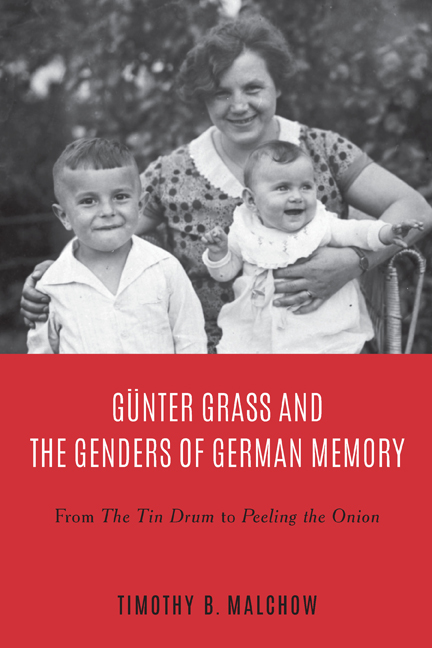Book contents
- Frontmatter
- Dedication
- Contents
- Acknowledgments
- Abbreviations, Translations, and Transcriptions
- Introduction
- 1 Grass’s Biography in Context: 1927–1959
- 2 Corporeal Memory, Trauma, and Art in The Tin Drum
- 3 Bildung, Heimat, and Gendered Modes of German Memory in The Tin Drum
- 4 A Patriarchal Arbiter of German Cultural Memory and His Feminized Others: Leveling Bildung, Opening Heimat, and Championing Art from the 1960s to the New Millennium
- 5 Grass’s Early Life Once Again: Broken Silence, Mourning, and Gendered Approaches to Memory in Peeling the Onion
- Epilogue
- Works Cited
- Index
5 - Grass’s Early Life Once Again: Broken Silence, Mourning, and Gendered Approaches to Memory in Peeling the Onion
Published online by Cambridge University Press: 09 February 2021
- Frontmatter
- Dedication
- Contents
- Acknowledgments
- Abbreviations, Translations, and Transcriptions
- Introduction
- 1 Grass’s Biography in Context: 1927–1959
- 2 Corporeal Memory, Trauma, and Art in The Tin Drum
- 3 Bildung, Heimat, and Gendered Modes of German Memory in The Tin Drum
- 4 A Patriarchal Arbiter of German Cultural Memory and His Feminized Others: Leveling Bildung, Opening Heimat, and Championing Art from the 1960s to the New Millennium
- 5 Grass’s Early Life Once Again: Broken Silence, Mourning, and Gendered Approaches to Memory in Peeling the Onion
- Epilogue
- Works Cited
- Index
Summary
NOW THAT GRASS IS NO LONGER ALIVE and over a decade has passed since the 2006 media furor surrounding his Waffen-SS disclosure, Peeling the Onion will likely emerge from the shadow of that moment, with its burdensome expectations. Scholarship will focus less on what the memoir fails to reveal and more on what it actually does. Martin Kölbel posits that the Waffen-SS scandal, along with others that marked Grass's career as a public figure, will now likely be reduced to marginalia as scholars consider his work and its aesthetic effects (Kölbel 2017, 410). Grass's masterpiece, The Tin Drum, will certainly continue to be read among a corpus of influential, twentieth-century German literary texts dealing with memory of the Nazi period. Peeling the Onion stands in a unique relationship to that novel, one that merits further investigation.
The Tin Drum proves to be the most prominent among the memoir's many intertexts, not least because it is the author's first narrative portrayal of his early life. The memoir refers to it repeatedly. Against the background of that novel and Grass's subsequent work, in this chapter I examine representations of memory and gender in Peeling the Onion. I begin by exploring German cultural memory and Grass's public persona in the period when he wrote the memoir, showing that competing narratives increasingly mediated both the Nazi past and his own life. Drawing on prior scholarship, I consider Grass's designation of his text as a “memory book” (“Erinnerungsbuch”) as part of a textual strategy to differentiate it from the genre of autobiography, foreground its failure to communicate authentic memory, and temporarily abdicate his own cultural authority, while nonetheless acknowledging the ethical need for interrogating the past. Similarities to The Tin Drum, and divergences from it, highlight Peeling the Onion's transformation of that earlier text's masculine narrative persona. The memoir's narrative emphasizes the narrator's struggle to access increasingly elusive memories, and it textually enacts his mourning, rather than trauma and melancholy. Like The Tin Drum, it represents both male-coded and female-coded aspects of memory and reproduces clichéd gender discourses. It highlights the masculine artist's confrontation with lesser forms of masculinity, evident in the dubious memories provided by other narratives that include not only canonical literature but, ironically, Grass's previous literary works as well.
- Type
- Chapter
- Information
- Günter Grass and the Genders of German MemoryFrom The Tin Drum to Peeling the Onion and Beyond, pp. 162 - 198Publisher: Boydell & BrewerPrint publication year: 2021

